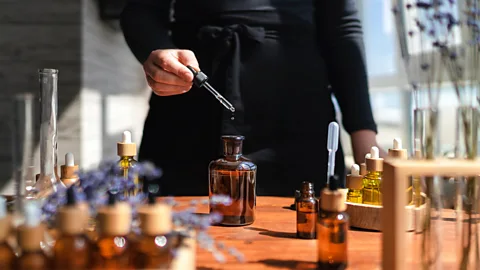 Getty Images
Getty ImagesThe old cliché says it’s good to stop and smell the roses. If you believe a series of viral videos, you may appreciate them more if you grew up in the US.
It started with an offhand comment about the weather from a friend of Harrison Szep, a 23-year-old UK migrant living in Florida. “He said something along the lines of ‘it smells like it’s about to rain’,” Szep says. It stopped him in his tracks. “For me this was a first, hearing this.”
Friends and family back in Cleethorpes, England had never mentioned this supernatural ability. Szep jumped on TikTok looking for answers, and posted a video calling the idea that Americans can smell the rain “ridiculous”.
The reaction was volcanic. It sparked a debate that stretched across more than 80,000 comments and dozens of videos from other users. “This is true,” user @yvanabee said in a response video viewed over six million times. “I noticed that my American friends were smelling more things than I was, like they were more in tune with the scents around them.” The American nostril, she claimed, is more keyed into everything from the bouquet of fresh cut grass to the smells associated with different seasons. “I call it ‘scent culture’.”
Countless people chimed in to argue these abilities are common all over the world, but ultimately, many agreed: Americans do smell better than Europeans (or, rather, their noses do).
 Getty Images
Getty ImagesThere are, of course, glaring problems with this theory. Chief among them is that many Europeans can indeed smell rain, fresh-cut grass and more. In fact, some of the earliest studies of petrichor, the scientific name for the smell of rain, were done by French and British chemists. That’s to say nothing of Europe’s rich history with perfume.
But like so many debates on social media, there’s a whiff of truth underpinning the conversation. Because your ability to smell does have a lot to do with who you are and where you’re from.
“There’s a lot of variation in the human sense of smell, including people’s ability to detect certain odours,” says Casey Trimmer, a research scientist who studies the olfactory system at DSM-Firmenich, a biotechnology company based in Switzerland that works in the fragrance business. Genetics plays a role, Trimmer says, “but things like age, gender, and ancestry can also influence how we perceive certain odours, in addition to cultural and experiential differences”.
Trimmer and others say it’s possible, if unlikely, that some combination of these factors give Americans an olfactory boost.
Smell (and taste) get less attention from the academic and medical communities than their sensory brethren hearing and sight. There has never been a study testing American sniffers against Europeans, according to Trimmer and several other olfactory researchers.
However, there is some research which has shown some surprising differences in smelling abilities among different populations, both within and across cultures.
Wake up and smell the gene pool
Common knowledge holds that women have a stronger sense of smell than men, a fact supported by research. (However, there’s little evidence to support the popular idea that pregnancy heightens your sense of smell, though it may make you more intolerant of certain odours.) But biological sex isn’t the only genetic variable that affects smell.
For example, some people have a genetic predisposition that makes them more sensitive to the scent of isovaleric acid, which has a distinct sweaty odour. By the same token, genetic differences make some people “blind” to certain smells, such as lyral, a chemical that smells of white flowers, or guaiacol, which smells smoky – both common perfume ingredients.
“We have a collection of more than 400 different receptors in our nose, but nobody has the same collection of receptors,” says Julien Wen Hsieh, a rhinology and olfactology surgeon at the Geneva University Hospitals in Switzerland. “This explains in part why there is so much variation in the sense of smell in the population.”
Our ability to detect odours – and how strong or pleasant we find them – also depends on how those detectors work in our own individual noses. We smell a fragrance like violets when a chemical called beta-ionone binds to a detector known as OR5A1. But for about half of people, that detector simply doesn’t work. You’ll never be able to smell beta-ionone if you’re one of them, no matter how much of it is sitting in a vial in front of you.
When rain hits dry soil, it can release a compound called geosmin, which has an earthy odour that’s a key component of the petrichor smell. Genetic variation can affect how people perceive earthy smells, Trimmer says, so its theoretically possible that DNA could make Americans better equipped to smell rain. But that’s unlikely, as more than half of Americans have European ancestry. “Their genetics, especially their olfactory genetics, are very similar,” she says.
Cultural aromas
Genes aren’t the whole picture, though. Some of your smelling prowess depends on training. Sommeliers are better able to tell different smells apart than untrained amateurs. In fact, a study of sommelier students found that their olfactory bulbs – a ball of nerve cells used for smelling in the nasal cavity – literally grew bigger over the course of their year-and-a-half wine programme.
Wine snobbery isn’t the only way to expand your sniffing abilities though. It seems some of that training happens naturally depending on the language and culture that surrounds you.
In English-speaking countries, people identify most smells by relating them to an object or a phenomenon: “it smells like rain”, for example. If we compare that to colours, that’s like saying “tomatoes are the colour of strawberries” instead of calling them red.
 Getty Images
Getty ImagesLanguage probably doesn’t account for any would-be variations between the noses of Europeans and Americans, though, says Rachel Herz a neuroscientist at Brown University in the US who studies the psychological effects of smell.
“Linguistically, the comparison between Americans and Europeans is meaningless [in this case],” Herz says. The UK, for example, shares a common language with the US. British and American English use the same words for scent, she says, “other than possible slang terms, of which I’m unaware. And if anything, I’d expect more of this kind of word play from Brits than Americans”.
Still, there are other reasons that cultures might have different olfactory skills. A 2014 study compared Cook Islanders, Europeans, and the Tsimané, an Indigenous people from the Bolivian rainforest. Cook Islands residents were significantly more sensitive to smells than the Tsimané, and both groups were significantly better at smelling than Europeans.
Previously, researchers assumed that living a life that’s more in tune with the land would improve your sense of smell. This study challenged that idea. Cook Island residents were the best sniffers, but the Cook Islands are as developed and industrialised as any country in Europe, while the Tsimané live off subsistence farming, hunting and foraging.
Pollution may be the culprit, the researchers said. Air pollution can significantly damage your sense of smell. The authors note that the Cook Islands are in the Pacific region, one of the least polluted areas on Earth, while the air quality of the Bolivian rainforest is better than Europe’s. The relative levels of pollution followed the order of sniffing ability.
Scents and sensibility
Like most compelling scientific questions, there’s no simple answer to why some populations smell better than others. Sensitivity to smells can vary even among populations that live in the exact same place.
A 2012 study that looked at 391 New Yorkers, almost all of whom lived in Manhattan, found some surprising olfactory differences. Asians in the study had slightly more sensitive smelling abilities than Caucasians, and both groups had higher olfactory acuity than African Americans. These differences held up even when you accounted for gender, age, smoking habits and body type.
 Getty Images
Getty ImagesWhat accounts for these differences? It could be genetics, culture or, theoretically, small variations in air quality across individual Manhattan neighbourhoods. Without more research, we can only speculate.
There’s one fundamental problem underpinning the entire discussion, however. “There is currently no universal test for olfaction,” Hsieh says. “Current tests are highly biased by cultural and genetic background, exclude many countries and cultures from having an effective test for olfaction and are adapted only for a handful of countries.”
Countries and cultures demonstrate wide differences in their familiarity with certain smells. Australians are probably more familiar (and therefore more sensitive) to the smell of eucalyptus than Canadians, for example. But according to Hsieh, existing smell tests don’t account for that problem. He and other researchers are currently working on a universal olfaction test that utilises “white smells“.
Like white noise, white smells would be equally unfamiliar no matter who is being tested, which would allow for more easily comparable test results. But until a such a test is established and researchers go out and use it, we won’t be able to sniff out a truly satisfying answer to the American smell question.
In the end, none of the potential influences on smelling are enough for Herz to believe that TikTok has noticed a real olfactory trend. Perhaps it just comes down to what people say out loud.
“Various individuals may verbally comment on smell more than others,” Herz says. “Overall, I am unaware and highly doubt that this behaviour is greater among Americans than Europeans.”
Read More: The great smell-off: TikTok sparks debate on American vs European noses


